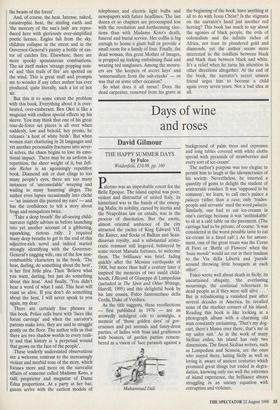Days of wine and roses
David Gilmour
THE HAPPY SUMMER DAYS by Fulco
Weidenfeld, £10.99, pp. 160 Palermo was an improbable resort for the Belle Epoque. The island capital was poor, violent and distrustful of united Italy, its hinterland was in the hands of the emerg- ing Mafia; its nobility, cursed by inertia and the Neapolitan law on entails, was in the process of dissolution. But the exotic, almost oriental ambience of the city attracted the yachts of King Edward VII, the Kaiser, and flocks of Balkan and Scan- dinavian royalty, and a substantial aristo- cratic remnant still lingered, bolstered by some recent Marsala fortunes, to welcome them. The brilliance was brief, fading quickly after the Messina earthquake of 1908, but more than half a century later it inspired the memoirs of two sunlit child- hoods, I Ricordi of Giuseppe di Lampedusa (included in The Siren and Other Writings, Harvill, 1995) and this delightful book by his late cousin, Fulco Santostefano della Cerda, Duke of Verdura.
As the title suggests, these recollections — first published in 1976 — are an avowedly indulgent ode to nostalgia, a memoir of 'those golden days' of gov- ernesses and pet animals and fancy-dress parties, of ladies with boas and gentlemen with boaters, of garden parties remem- bered as a vision of 'lace parasols against a Muhammad Dali background of palm trees and cypresses and long tables covered with white cloths spread with pyramids of strawberries and every sort of ice-cream'.
The author's purpose was too elegiac to permit him to laugh at the idiosyncrasies of his society. Nevertheless, he inserted a quantity of gems to delight the student of aristocratic conduct. It was 'supposed to be common', we learn, to call one's palace a palazzo rather than a casa; only 'trades- people and servants' used the word palazzo. Similarly, one had to eat ice-creams in one's carriage because it was 'unthinkable' to sit at a café table on the pavement. (The carriage had to be private, of course: 'it was considered in the worst possible taste to eat ice-cream in a hired cab'.) As for amuse- ment, one of the great treats was the Corso di Fiori or 'Battle of Flowers' when the `beau monde' would set out in their landaus to the Via della Liberea and 'parade around throwing little bouquets at each other'.
Fulco wrote well about death in Sicily, its uncurtained ubiquity, 'the everlasting mournings, the continual references to dead people as if they were still alive . . . ' But in refashioning a vanished past after several decades in America, he recalled none of the murkier corners of his island. Reading this book is like looking at a photograph album with a charming old man constantly exclaiming, 'That's my dog- cart, there's Mama over there, that's me in my sailor suit.' As in the work of many Sicilian exiles, his island has only two dimensions. The finest Sicilian writers, such as Lampedusa and Sciascia, are the ones who stayed there, hating Sicily as well as loving it, aware of ancient centuries which promised great things but ended in degra- dation, knowing only too well the extremes of island experience, the brilliance always struggling in an uneasy equation with corruption and violence.
























































 Previous page
Previous page